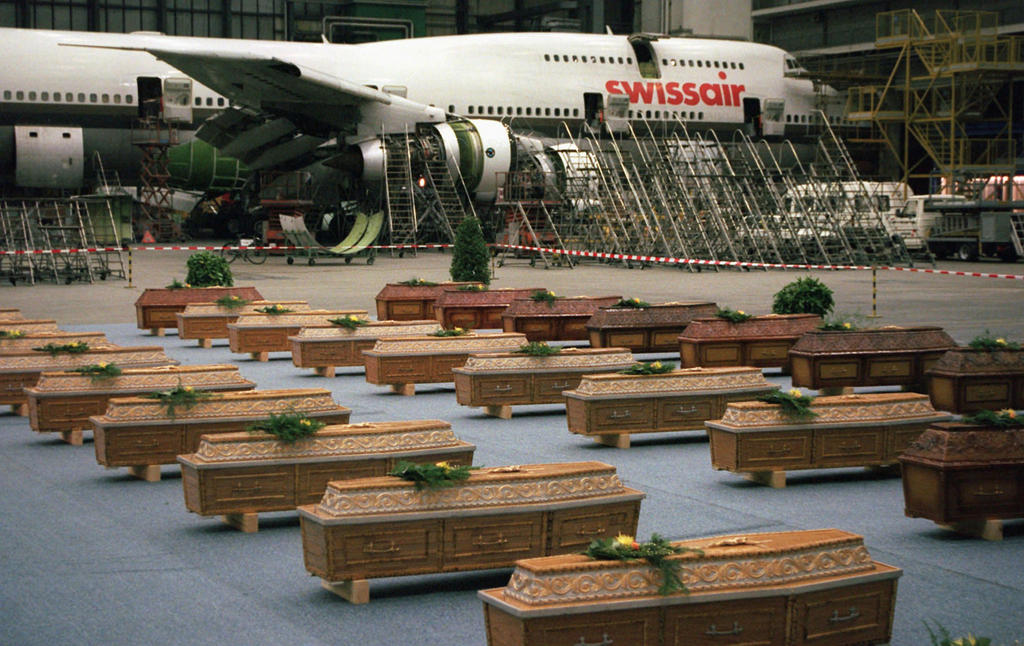
Terrorism 20 years after the Luxor tragedy

On November 17, 1997, Islamic extremists killed 36 Swiss tourists in Luxor, Egypt. It was the deadliest terrorist attack ever involving Swiss citizens. Twenty years later, terrorism is still causing fear. But contrary to what might seem to be the case, there are now fewer attacks and fewer victims.
“Massacre of the innocents”, “Death on the Nile”, “Horror in the Valley of the Kings”, “Swiss butchered in Luxor”: on November 18 the frontpage headlines of Swiss newspapers were all about the previous day’s killings.
At the archaeological site at Deir el-Bahari, near Luxor, a group of terrorists belonging to the Islamist organisation al-Gama’at al-Islamiyya had opened fire on a crowd of tourists: 62 dead, 36 of them Swiss.

More
‘I immediately realised my wife was dead’
Since 1970 there have been about 60 Swiss victims of terrorist attacks. The Luxor incident remains the deadliest ever attack on Swiss citizens.
Swiss are obviously not the only victims of terrorism. And Egypt is not the only country plagued by the phenomenon. Between 2012 and 2016, there were 33,000 terrorist attacks around the world, causing 153,000 deaths in a large number of countries, according to the Global Terrorism DatabaseExternal link (GTD) of the University of Maryland, the largest of its kind*. With 6,300 victims, June 2014 was the deadliest month.
Following the January 2015 attack on the offices of Charlie Hebdo in Paris, the terrorist threat has returned to the fore in Europe. From Paris to Brussels, from London to Berlin, and not forgetting the recent attack in Barcelona, terrorism has been striking major cities across the continent. Though it is not a particular target of Islamic terrorism, Switzerland too needs to be better prepared for what might happen, Albert A. Stahel, a military strategy expert, told swissinfo.ch in November 2016.
Yet Europe is not the main focus of the violence. Since 2012, casualties of terrorism in Western Europe have made up less than 0.3% of the total number of victims. As our chart shows, the great majority of victims of attacks can be found in five Asian or African countries.
Despite the marked increase in these attacks since 2000, mainly due to the activities of al-Qaeda, the Taliban, Boko Haram and the Islamic State, terrorist acts are in worldwide decline, according to the GTD. After peaking in 2014, the numbers both of attacks and victims went down in 2015 and 2016.
*A terrorist attack is defined by the GTD as the threatened or actual use of illegal force and violence by a non-state actor to attain a political, economic, religious, or social goal through fear, coercion, or intimidation.
Switzerland and terrorism
“At present, Switzerland is not a likely target for Islamic terrorism. But it should prepare better to face this kind of threat.” That was the view of Albert A. Stahel, a Swiss military strategy expert, in an interview with swissinfo.ch in November 2016.
The country’s vulnerability was considerable, he said. “Roads, railways, power supplies, communications, pipelines: we have infrastructures second to none. But the denser and more heavily used an infrastructure is, the more it is open to attack.”
When an attack happens, he pointed out, it is already too late to take action. “The effort needs to be put into prevention, detection of risks and taking of security measures. We do not have the resources, really – police forces are our only means of protection, but they are understaffed. They need to be strengthened.”
As for the army, it could be part of such an effort by training special units able to intervene in the event of terrorist threats, Stahel said.
(Translated by Terence MacNamee)

In compliance with the JTI standards
More: SWI swissinfo.ch certified by the Journalism Trust Initiative
































You can find an overview of ongoing debates with our journalists here . Please join us!
If you want to start a conversation about a topic raised in this article or want to report factual errors, email us at english@swissinfo.ch.